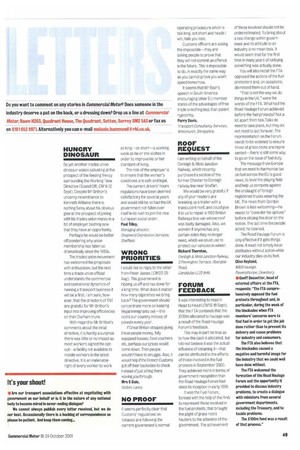HUNGRY DINOSAUR
Page 49

If you've noticed an error in this article please click here to report it so we can fix it.
So yet another trades union dinosaur wakes salivating at the prospect of the feeding frenzy surrounding the Working Time Directive (Sound Off, CM 6-12 Sept). Despite Mr Britton's uncanny resemblance to Kenneth Williams there is nothing funny about his obvious glee at the prospect ofjoining with his trades union mates in a bit of employer bashing now that they have an opportunity.
Perhaps he would be better off pondering why union membership has fallen so dramatically since the 1980s.
The trades union movement has welcomed the proposals with enthusiasm, but the next time a trade union official understands the commercial and operational dynamics of running a transport business it will be a first. I am sure, however, that the directors of TNT are grateful for Mr Britton's input into improving efficiencies on their Durham trunk.
With regard to Mr Britton's comments about the initial directive, it is hardly a surprise there was little or no impact as most workers signed the optout—a facility not available to mobile workers in the latest directive. It is an inalienable right of every worker to work as long—or short—a working week as he or she wishes in order to improve his or her standard of living.
The role of the employer is to ensure that the worker's conditions are safe and legal.
The current drivers' hours regulations have been deemed satisfactory for several years and would still he so had the UK government not fallen over itself in its rush to join the new European social order.
Paul Tilley,
Managing director, Shepherd Distribution Services, Sheffield.
WRONG PRIORITIES I would like to reply to the letter from Peter James (CM23-29 Aug). This government is ripping us off and has done for a longtime. What does it matter how many cigarettes we bring back? The government should concentrate more on keeping illegal immigrants out—this costs our country millions of pounds every year.
If Great Britain stopped giving these people money, fully equipped houses, food vouchers etc. perhaps our prices would come down. Then people wouldn't have to smuggle. Also, it would help if the French Customs got off their backsides to check instead ofjust sitting there waving you through.
Mrs S Dale,
Bolton, Lancs.
NO PROOF
It seems perfectly clear that Customs' regulations on tobacco are following the current government's normal operating procedure which is talk long, act short and heads I win, tails you lose.
Customs officers are asking the impossible—they are asking people to prove that they will not commit an offence in the future. This is impossible to do, in exactly the same way as you cannot prove you won't speed tomorrow.
it seems that Mr Blair's speech in South America encouraging other ELJ member states of the advantages of free trade is nothing less than patent hypocrisy.
Parry Davis,
Transport Consultancy Services, Whitchurch, Shropshire,
REQUEST
I am writing on behalf of the Denbigh & Mold Junction Railway, which recently purchased a section of the former Chester to Denbigh railway line near Bodfari.
We would be very grateful if any of your readers are breaking up a trailer with a translucent roof, and could give it to us to repair a 1962 British Railways box van whose roof was badly damaged. Also, we wonder if anyone has any curtain sides they no longer need, which we could use to protect our vehicles in winter. Richard Thornton, Denbigh & Mold Junction Railway, 2 Pennington Terrace, Abe rgele Road,
Llanddulas 1122 SHN, FORUM FEEDBACK
It was interesting to read in Head to Head (CM13-19 Sept), that the FTA contends that the £100m allocated to haulage was a result of the Road Haulage Forum's feedback.
This may in part be true as to how the cash is allocated, but I do not believe it was the actual influence of obtaining it—that can be attributed to the efforts of those involved in the fuel protests in September 2000. They achieved more in terms of government recognition than the Road Haulage Forum had since its inception in early 1999.
It was the Fuel Forum, formed with the help of the RHA to represent those involved in the fuel protests, that brought the plight of grass roots hauliers to the attention of the government. The achievement












































































































































